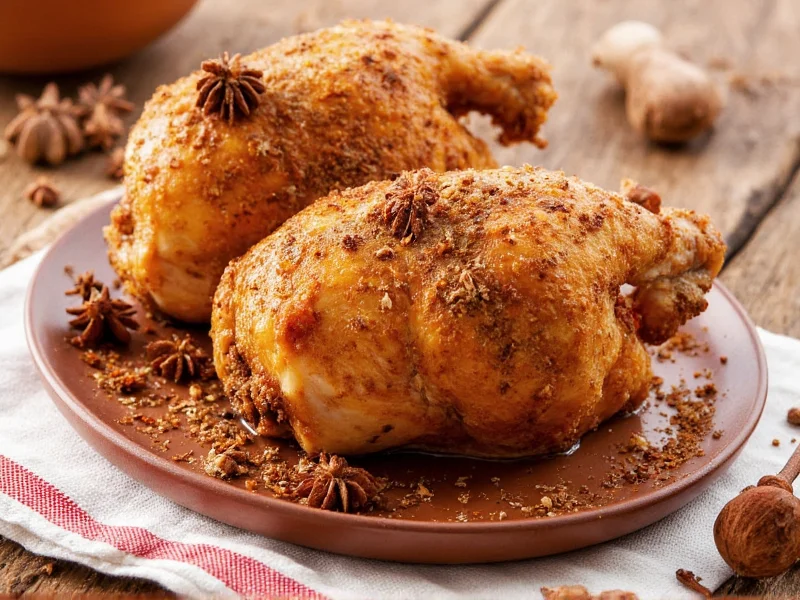Adding spices to your chickens' diet isn't just a culinary experiment—it's a practical approach to enhancing poultry health through natural means. Backyard chicken keepers increasingly seek natural alternatives to commercial supplements, and certain spices offer proven benefits without the chemicals found in many conventional poultry products.
Top 5 Beneficial Spices for Chicken Health
Research shows that specific spices can significantly improve chicken wellness when incorporated properly into their diet. Unlike synthetic additives, these natural options provide multiple health benefits while being cost-effective for small-scale poultry operations.
| Spice | Health Benefits | Recommended Amount | Special Notes |
|---|---|---|---|
| Garlic | Natural antibiotic, boosts immune system, repels parasites | 1-2 cloves per gallon of water or 1% of feed | Use raw crushed garlic for maximum allicin content |
| Turmeric | Anti-inflammatory, improves digestion, enhances yolk color | 1 teaspoon per 5 lbs feed | Combine with black pepper for better absorption |
| Oregano | Natural antibiotic, improves gut health, reduces pathogens | 1-2% of total feed | More effective than some commercial antibiotics in studies |
| Cinnamon | Antimicrobial, regulates blood sugar, may boost egg production | 1 teaspoon per 5 lbs feed | Helps reduce respiratory issues in cold weather |
| Ginger | Digestive aid, reduces inflammation, improves circulation | 1 teaspoon grated per 5 lbs feed | Especially beneficial during molting season |
How Spices Benefit Poultry Health
Understanding what spices can chickens eat safely requires examining their physiological effects. Chickens process certain plant compounds differently than mammals, making some human-safe spices potentially problematic while others provide exceptional benefits.
Garlic: Nature's Poultry Medicine Cabinet
When considering what spices are good for chickens to eat, garlic stands out as the most researched option. Multiple studies confirm that chickens consuming garlic-infused water show significantly lower parasite loads and stronger immune responses. The active compound allicin works as a natural dewormer without the chemical residues of conventional treatments. For backyard chicken keepers seeking natural chicken feed supplements, adding one crushed clove per gallon of drinking water twice weekly provides optimal benefits without overwhelming their system.
Turmeric's Dual Action for Digestion and Egg Quality
Turmeric offers two key advantages for poultry: improved digestive health and enhanced egg quality. The curcumin in turmeric reduces inflammation in the digestive tract while simultaneously depositing carotenoids that deepen yolk color. When exploring how to add spices to chicken feed, combine turmeric with a small amount of black pepper and healthy fat (like flaxseed) to increase absorption. This combination represents one of the most effective natural supplements for backyard chickens looking to improve egg production naturally.
Spices to Avoid Feeding Chickens
Not all spices suitable for human consumption work well as chicken feed additives. Certain spices can cause digestive distress or even toxicity in poultry. Understanding which spices chickens should not eat prevents potentially dangerous feeding practices.
- Nutmeg - Contains myristicin which can cause neurological issues in high quantities
- Excessive cayenne - While small amounts can benefit circulation, too much causes respiratory distress
- Spices with high salt content - Many commercial spice blends contain salt harmful to chickens
- Star anise - Contains compounds that may interfere with normal development
Practical Implementation Guide
Introducing spices to your flock requires careful implementation to maximize benefits while avoiding digestive upset. The best approach for incorporating what spices are good for chickens to eat follows these guidelines:
Gradual Introduction Protocol
Always introduce new spices slowly over 7-10 days. Start with half the recommended amount and monitor your birds for any adverse reactions. Healthy chickens show no negative effects from appropriate spice levels, but individual sensitivities may occur. The ideal method for adding spices to chicken feed involves mixing them with moistened feed or scattering them in dust bathing areas for natural consumption.
Seasonal Considerations for Spice Feeding
Adapt your spice regimen to seasonal needs when determining what spices can chickens eat safely throughout the year. During summer months, increase cooling spices like mint and parsley to help chickens regulate body temperature. In winter, boost circulation-enhancing spices like ginger and cayenne (in moderation) to maintain health during cold periods. This seasonal approach to natural chicken feed supplements ensures year-round benefits without overloading their system.
Scientific Support for Poultry Spice Supplementation
Recent poultry nutrition research validates traditional practices of using spices as feed additives. A 2023 study published in the Journal of Poultry Science demonstrated that chickens receiving oregano-supplemented feed showed 23% fewer intestinal pathogens compared to control groups. Similarly, research from the University of California's poultry program found that turmeric-enhanced feed improved egg yolk color scores by 37% while maintaining excellent shelf stability.
These findings support what many backyard chicken enthusiasts have discovered through practical experience: certain spices provide measurable health benefits without the drawbacks of synthetic additives. When properly implemented as part of a balanced diet, spices represent one of the most accessible natural supplements for backyard chickens.
Creating Your Own Spice-Enhanced Feed Blend
For those seeking the best herbs and spices for backyard chickens, creating a custom blend ensures optimal freshness and potency. Combine equal parts dried oregano, turmeric, and cinnamon with half parts dried garlic powder. Store in an airtight container away from light, and add 1-2 tablespoons per 5 pounds of regular feed. This simple mixture delivers multiple health benefits while being cost-effective for small flocks.
Remember that spices should complement—not replace—proper nutrition. They work best as supplements to a complete, balanced chicken feed rather than primary nutrition sources. When implemented correctly, these natural additives can significantly improve your flock's health and productivity through what many consider the best natural chicken feed supplements available.











 浙公网安备
33010002000092号
浙公网安备
33010002000092号 浙B2-20120091-4
浙B2-20120091-4